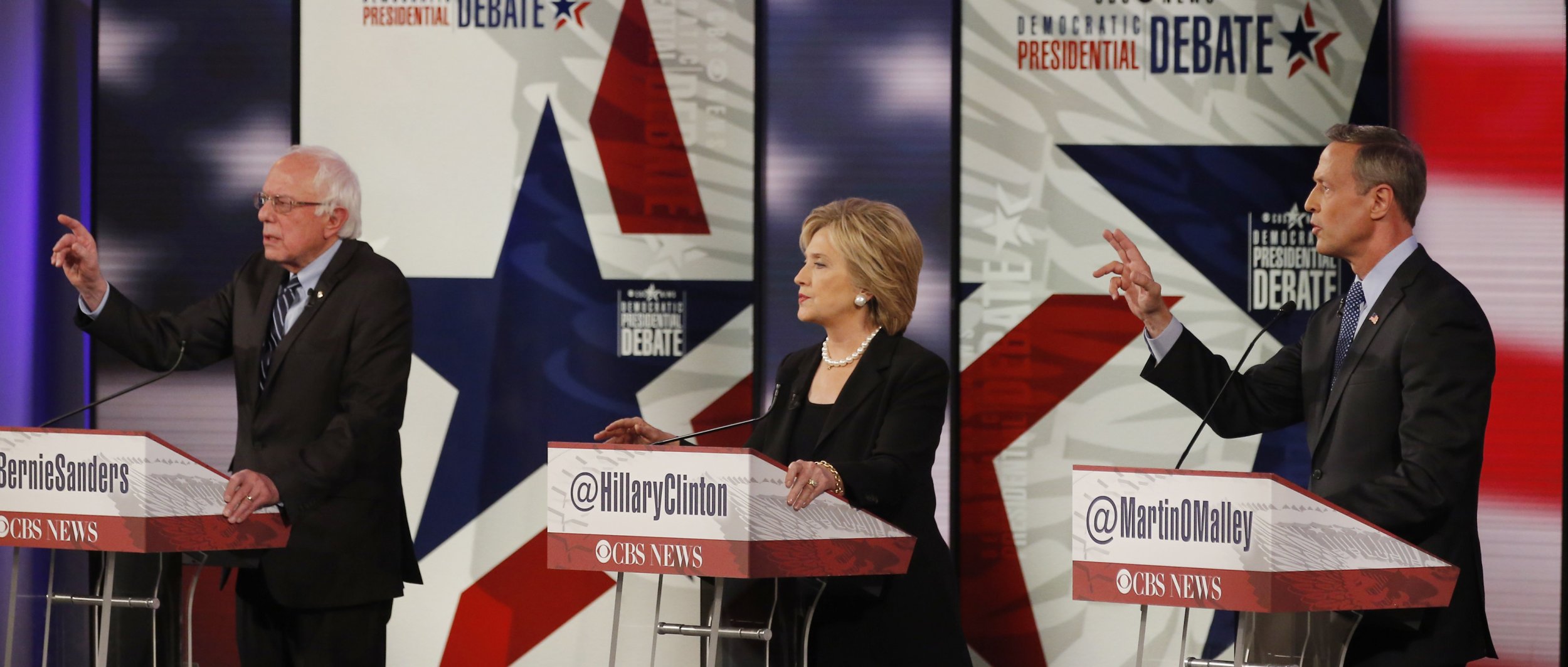
Previous presidential debates began with the national anthem. Saturday's began with a moment of silence.
The attacks in Paris, which left at least 129 people dead, have already started to affect the U.S. presidential race. On the Democratic side, the renewed discussion of counterterrorism policy has done little to differentiate the three remaining candidates, but it highlights their differences with the Republicans.
Bernie Sanders, Martin O'Malley and Hillary Clinton have mostly sided with President Barack Obama's policies on countering the Islamic State militant group (ISIS), admitting refugees from Syria into the U.S. and refusing to use the term "radical Islamic terrorism" to describe the militant groups with whom America has struggled, including ISIS and Al-Qaeda. They differ mostly on the details. O'Malley has called for admitting 65,000 Syrian refugees into the U.S. (the White House has plans to admit 10,000), whereas Sanders refused to name a "magic number." None of the candidates wants to put ground forces in the region, but Clinton supports a no-fly zone, an already hard to achieve goal made more difficult by the recent French airstrikes on ISIS targets.
All three Democratic presidential candidates have cited the Iraq War as an example of what not to do in the Middle East, but so far they have mostly avoided coming up with new policies that inspire confidence, considering where the U.S.'s efforts currently stand. During the debate, Clinton touted her record as a supporter of the Pentagon's train and equip program, which aimed to mobilize local rebel forces in Syria but was recently suspended by the administration for failing to meet its goals. O'Malley appeared on MSNBC Monday afternoon to stress the importance of leading a global coalition against ISIS, which the U.S. is already doing.
During a speech Monday at the G-20 summit in Turkey, Obama urged the U.S. and its partners to not "equate" the refugees fleeing Syria with terrorists. If current trends hold, that will inevitably become the narrative. Republican candidates were already responding to his speech Monday afternoon by calling on the executive branch to stop letting in refugees.
Mike Huckabee even urged Paul Ryan, the new speaker of the House, to stop resettlement through legislation or step down. Ben Carson, who is currently leading in the polls for the Republican nomination, forwarded a petition to his supporters with the subject line "Add your name: no Syrian refugees in the U.S."
During his TV interview, O'Malley criticized these proposals as "isolationism." The idea of closing the U.S.'s doors to refugees certainly evokes an earlier period of American history. Prior to World War II, the U.S. turned away large groups of Jewish emigrants seeking to leave Germany after the ascension of the Nazis in 1933.
Describing the conflict in Syria to ABC, Marco Rubio, who describes foreign policy as one of his strengths, said that Democrats should admit the U.S. is at war with radical Islam.
"That would be like saying we weren't at war with Nazis, because we were afraid to offend some Germans who may have been members of the Nazi Party but weren't violent themselves."
He added, "There is no middle ground on this. Either they win or we win. And we need to begin to take this seriously. These are individuals motivated by their faith."
After the September 11 attacks, President George W. Bush delivered a similar line: "You're either with us or you're with the terrorists." But he also took pains to avoid antagonizing Muslims, saying that the attackers represented "a fringe movement that perverts the peaceful teachings of Islam."
Uncommon Knowledge
Newsweek is committed to challenging conventional wisdom and finding connections in the search for common ground.
Newsweek is committed to challenging conventional wisdom and finding connections in the search for common ground.
About the writer
Jack Martinez is a writer from Great Falls, Montana. He attended Stanford University, where he studied the Classics and received ... Read more
To read how Newsweek uses AI as a newsroom tool, Click here.








